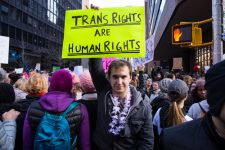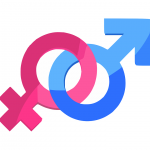Australian Transgender Laws Are a Violation of Human Rights

On March 17, the United Nations Committee on Human Rights in Geneva ruled Australian laws that require married transgender people to get a divorce if they want to change the sex on their birth certificates are in violation of international human rights.
The case was brought against the Australian government by a married transgender woman from NSW known as Grace. She first brought the complaint in 2011, after the NSW Births, Deaths and Marriages Registry denied her multiple requests to alter her birth certificate.
The Australian government argued in its submission to the UN that the laws are necessary to uphold the Commonwealth Marriage Act 1961, which defines marriage under section 5(1) as “the union of a man and a woman to the exclusion of all others.”
Currently, in six out of eight Australian states and territories it’s illegal for a married person to change the sex on their birth certificate. However, married transgender people are able to change the sex on their passports with relative ease.
The UN committee monitors the implementation of the International Covenant on Civil and Political Rights (ICCPR) by nations that are a party to the international treaty. Australia ratified the agreement on August 13 1980.
In its landmark ruling, published on June 15, the committee found that the Australian laws were in breach of two ICCPR articles.
In requiring Grace divorce her spouse in order to change her birth certificate, the committee found that this “constitutes arbitrary or unlawful interference with her privacy and family,” which is in breach of article 17 of the covenant.
The requirement was also found to be violation of article 26 of the ICCPR, which outlines that an individual should not be discriminated against on the grounds of their marital status or gender identity.
Grace’s story
Grace was born in NSW in 1974. In 2000, she began her gender transition. She changed her name on several of her identification documents in 2002. She was married in September 2005, and underwent gender affirmation surgery in October that same year.
In January 2006, Grace applied to the NSW registry to have the sex changed on her birth certificate, but her application was rejected. In 2007, she was issued with an Australian passport stating that she was female. Grace was again refused a change of sex on her birth certificate in 2008 and 2010.
As the UN committee outlined in their report, a birth certificate is the primary identity document from which all other documents are issued in Australia. And for the purposes of the majority of the laws in the country a person is treated as the sex recorded on that document.
The conflict between the reality of a person’s gender and the sex stated on their birth certificate can lead to difficulties in obtaining employment and housing. And not only can this cause an invasion of an individual’s privacy, but it can lead to incidents of discrimination and harassment.
The Transgender Act
In June 1996, the Transgender (Anti-Discrimination and Other Acts Amendment) Act was passed through NSW state parliament. The act amended the NSW Anti-Discrimination Act 1977 to make discrimination and vilification on transgender grounds unlawful.
It also amended the NSW Births Deaths and Marriages Registration Act 1995 to allow for a change of sex on a birth certificate. This can now be done if an individual is over the age of 18, has undergone gender affirmation surgery and is not married.
The Transgender Act was drafted with the provision to prevent a married person being able to change the sex on their birth certificate so as not to conflict with the Marriage Act.
State laws
Over recent years, there’s been a push to change the state laws that prohibit married transgender people from altering their birth certificates. In October 2014, several Greens parliamentarians in South Australia, NSW and Tasmania introduced bills to change the laws.
However, only two jurisdictions in the nation currently allow for married individuals to make these changes. The ACT changed the law in 2008 to allow married transgender people to change the sex on their birth certificates.
While in South Australia the SA Births, Deaths and Marriages Registration (Gender Identity) Amendment Bill 2016 was passed through parliament on December 6 last year. So today in SA, married transgender people are able to alter their birth certificate and remain married.
This brought to an end a long battle to have the “draconian” SA Sexual Reassignment Act 1988 repealed. SA Greens MLC Tammy Franks was a key campaigner in having the gender identity amendment bill passed through parliament at the end of last year, along with a suite of other LGBTIQ laws.
Ms Franks said the forced divorce laws are “a human rights scourge” and there’s an urgent need for them to be revoked in all jurisdictions throughout Australia, as they “hurt unnecessarily and deeply.”
“No one should have to choose between being recognised as the person they are by sacrificing their legal bond with the person they love.” Ms Franks told Sydney Criminal Lawyers®. “The UN is right to push for urgent action to remove these ridiculous laws.”
It just doesn’t add up
In 2011, the Rudd government implemented changes that made it easier for transgender people to change the sex on their passports. This procedure was set in place in response to difficulties being encountered by transgender people traveling overseas.
The UN committee found that the Australian government’s explanation that a change in sex on Grace’s birth certificate would “result in irreconcilable and unacceptable conflict with the Marriage Act,” was incompatible with the government issuing her with a passport stating she is female.
Same-sex marriage
As Grace has pointed out if same-sex marriage was legalised in Australia, then the whole debate would be void.
However, despite what Australian Defence Industry minister Christopher Pyne has been heard saying, same-sex marriage still seems to be a long way off, as the Turnbull government continues to insist on holding a plebiscite.
Indeed, the Howard government amended the Marriage Act back in 2004 to ensure that the definition of a marriage was between a man and a woman, so as to prevent same-sex marriage becoming a reality.
The United Nation’s ruling
The UN Committee on Human Rights directed the Australian government to provide Grace “with a birth certificate consistent with her sex.” It also advised that legislative changes be made in order “to prevent similar violations in the future.”
The committee ordered Australia to respond to the ruling by December 15. The federal government is currently consulting with the NSW state government on a response to the directions.
Although Australia has ratified the ICCPR, and is obliged to respond to the committee’s ruling, as this is in the realm of international law, there is nothing that requires Australia to actually follow the directives.







